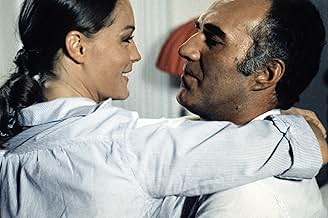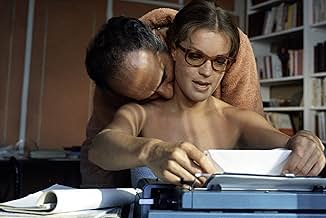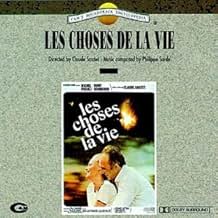A highway engineer is involved in a car crash, after which, near death, he remembers his life leading up to the accident.A highway engineer is involved in a car crash, after which, near death, he remembers his life leading up to the accident.A highway engineer is involved in a car crash, after which, near death, he remembers his life leading up to the accident.
- Awards
- 1 win & 2 nominations total
Featured reviews
By watching this 1969 movie, I have just confirmed my opinion about Claude Sautet: that's one Director that takes the expectator "inside the scene" (As seen in his latest work: Nelly and Mr.Arnaud). He has this ability that allows him to "extract" the most of his characters in the psychologic aspect, by showing all the range of their feelings...Take the scene where Pierre Berard (portrayed by Michel Piccoli) tells Héléne (played by Romy Schneider) of his sudden decision of no longer accompany her on a trip planned ages ago. Another scene that worths appears in a record as a "Death Scenes Hall of Fame" is the one in which Pierre lays on the grass, his thoughs exposed as the expectator follows him, in all his emotional suffering. Claude Sautet: a Director that deserves having his name written in the "Hall of Fame of the Greatest Directors of All Times". As an "homage" to him, in a scale of 10, I grade this film 9.
"Les choses de la vie" is the ultimate "mid life crises" movie. A middle aged man must (but can not) choose between his younger girl friend on the one hand and his ex wife and son on the other hand. As a result he gets irritated and frustrated. He smokes heavily and drives aggressively.
Michel Piccoli wonderfully impersonates this character (Pierre Berard). It was a good choice of television channel "Arte" to select this film in memory of Michel Piccoli, who died in may 2020 at the age of 94.
"Les choses de la vie" also was the film in which director Claude Sautet changed from "crime" to "drama", and especially the drama of the middle class. He so became a sort of French Ozu. But where the middle aged Japanese man above all is interested in the marriages of his daughters (or the lack thereoff), the European middle aged man tries to prove that he is still capable by taking a younger mistress.
Sautet tells the story in a peculiar chronological order. Center piece in the movie is a car accident with Pierre as its victim (after all he was driving aggressively). Just like a stone thrown in the water gives wrinklings moving in ever wider circles, the injured Pierre has memories that go further and further back in time. At the end there is no clear distinction anymore between memories and dreams.
Michel Piccoli wonderfully impersonates this character (Pierre Berard). It was a good choice of television channel "Arte" to select this film in memory of Michel Piccoli, who died in may 2020 at the age of 94.
"Les choses de la vie" also was the film in which director Claude Sautet changed from "crime" to "drama", and especially the drama of the middle class. He so became a sort of French Ozu. But where the middle aged Japanese man above all is interested in the marriages of his daughters (or the lack thereoff), the European middle aged man tries to prove that he is still capable by taking a younger mistress.
Sautet tells the story in a peculiar chronological order. Center piece in the movie is a car accident with Pierre as its victim (after all he was driving aggressively). Just like a stone thrown in the water gives wrinklings moving in ever wider circles, the injured Pierre has memories that go further and further back in time. At the end there is no clear distinction anymore between memories and dreams.
With "les choses de la vie" ,Claude Sautet relinquished his former style ,film noir ("classes tous risques" "l'arme à gauche" both worth seeking)in favor of bourgeois psychological dramas .
"Les choses de la vie" was the first link on the chain,and -with the exception of "Max et les ferrailleurs" (1971),which showed Sautet at the height of his powers,when he came back for a short while to his first inspiration-remains the best of this "cinema de qualité".
Unlike the other works ("Mado" "Cesar et Rosalie" "Vincent,François,Paul et les autres" "une histoire simple" ,etc etc etc) ,"les choses de la vie" has an emotional power and an unusual inventive direction.Editing is stunning (the first picture is one wheel of the car ),and never a car accident was filmed with such mastery.Flashbacks are used with great skill too.The nightmare scene (the wedding) remains very impressive today.And the metaphorical way Sautet uses to depict the hero's death commands respect and admiration.The last part of the movie is almost completely silent,but the strength of the pictures and the actors' talent (Piccoli,Schneider,but Lea Massari and Jean Bouise too)work wonders.Superb score.louis Delluc prize.
Remake :"intersection" featuring Richard Gere.As I cannot say something nice...
"Les choses de la vie" was the first link on the chain,and -with the exception of "Max et les ferrailleurs" (1971),which showed Sautet at the height of his powers,when he came back for a short while to his first inspiration-remains the best of this "cinema de qualité".
Unlike the other works ("Mado" "Cesar et Rosalie" "Vincent,François,Paul et les autres" "une histoire simple" ,etc etc etc) ,"les choses de la vie" has an emotional power and an unusual inventive direction.Editing is stunning (the first picture is one wheel of the car ),and never a car accident was filmed with such mastery.Flashbacks are used with great skill too.The nightmare scene (the wedding) remains very impressive today.And the metaphorical way Sautet uses to depict the hero's death commands respect and admiration.The last part of the movie is almost completely silent,but the strength of the pictures and the actors' talent (Piccoli,Schneider,but Lea Massari and Jean Bouise too)work wonders.Superb score.louis Delluc prize.
Remake :"intersection" featuring Richard Gere.As I cannot say something nice...
I loved the novel . And I was seduced by the film. Because it represents more than a good adaptation.
First, it is a beautiful new demonstration of the art of Claude Sautet to explore facts behind the silence veil, from the complexity of relation to the vulnerabilities and certitudes, the basic traits of bourgeous life and the spirit of family, the loneliness and the game of apparences.
Second, for the great acting .
Not the last, for the powerful scenes, the most intense remaining the wedding and the ship ignoring him. Romy Schneider is just admirable in each scene, few of them reminding The assasination of Trotsky.
More than a good adaptation, it is a poem about essence of life, about regrets, decissions and force / meanings of love. And , sure, about the cold plus tard.
One of the most impressive virtues, the scenes of accident , splendid because, reading, years ago, the novel, I believed than that scenes are impossible to be proposed by a film . But, I ignored the gifts of a Claude Sautet.
First, it is a beautiful new demonstration of the art of Claude Sautet to explore facts behind the silence veil, from the complexity of relation to the vulnerabilities and certitudes, the basic traits of bourgeous life and the spirit of family, the loneliness and the game of apparences.
Second, for the great acting .
Not the last, for the powerful scenes, the most intense remaining the wedding and the ship ignoring him. Romy Schneider is just admirable in each scene, few of them reminding The assasination of Trotsky.
More than a good adaptation, it is a poem about essence of life, about regrets, decissions and force / meanings of love. And , sure, about the cold plus tard.
One of the most impressive virtues, the scenes of accident , splendid because, reading, years ago, the novel, I believed than that scenes are impossible to be proposed by a film . But, I ignored the gifts of a Claude Sautet.
French films are famous for their depiction of minor incidents which converge at a larger point to make up the most of what happens in the lives of people. This helps viewers to have a better idea of protagonists' lives. French director Claude Sautet chose to base his film on this premise as he films the personal as well as professional lives of a successful yet unhappy man. From a career point of view, actor Michel Piccoli is shown as somebody doing well in life as he is appreciated by everybody around him. However, his personal life is in turmoil as he is unable to decide between his wife and his mistress. As he is about to solve this dilemma, a tragedy unfolds in his life. This is hardly the description of an original story but what makes the film interesting is how it has been shot. Apart from describing in detail minor incidents related to the lives of protagonists, Claude Sautet has used all his imagination to film the accident scene which occupies a large part of this film's screen space. Finally, once the film is over, some viewers might be tempted to call it the most important moment of the film.
Did you know
- TriviaCigarette count: 46
- GoofsIn the car crash scene, the stunt double for Michel Piccoli is seen wearing brown gloves in close-ups. However Piccoli is bare-handed while driving.
- ConnectionsFeatured in Claude Sautet ou La magie invisible (2003)
- How long is The Things of Life?Powered by Alexa
Details
- Release date
- Countries of origin
- Language
- Also known as
- These Things Happen
- Filming locations
- Rue de Sèvres, Paris 7, Paris, France(Hélène shopping)
- Production companies
- See more company credits at IMDbPro
Box office
- Gross US & Canada
- $5,063
- Gross worldwide
- $5,063
- Runtime
- 1h 29m(89 min)
- Sound mix
- Aspect ratio
- 1.66 : 1
Contribute to this page
Suggest an edit or add missing content































